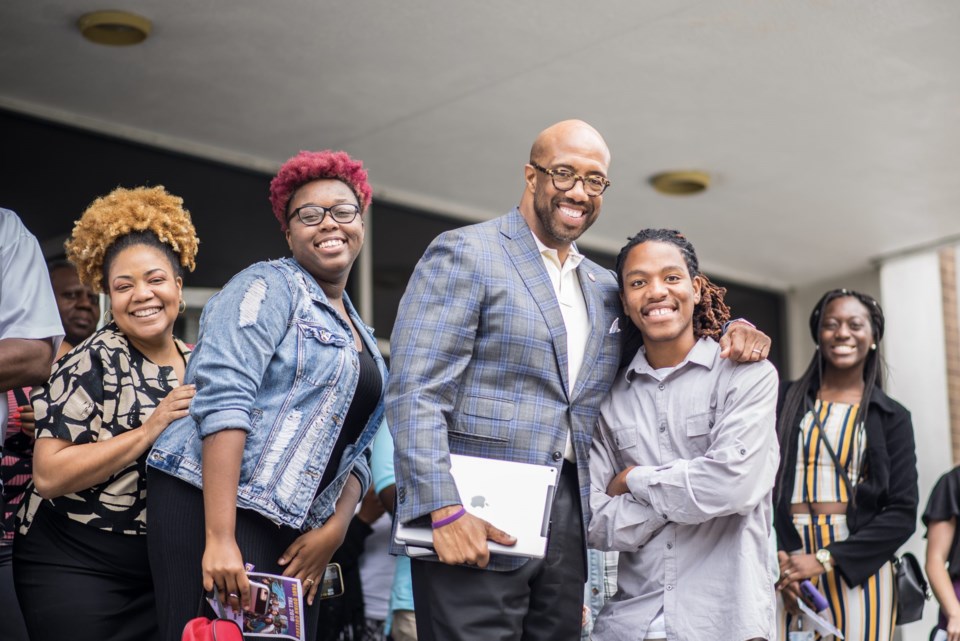At Paul Quinn College, the typically scalding summer heat was reaching its triple-digit apex when Dr. Michael J. Sorrell stepped before the anxious group. It was a late afternoon in June 2009, and a gaggle of students, alums and reporters filled the cramped conference room on the campus of Paul Quinn College in the South Dallas neighborhood of Highland Hills. Each attendee had weathered the withering heat because they wanted to know what was going to happen to Paul Quinn College, the oldest liberal arts college for African Americans in Texas.
For the previous two years, Sorrell, the college’s president, had been trying to usher the storied school into a new era. Paul Quinn College has a long history; in 1872, in the wake of the Civil War, a small group of Black preachers founded the school to educate freed slaves. But in recent years, the college had been hampered by years of declining enrollment and a dangerously low cash flow.
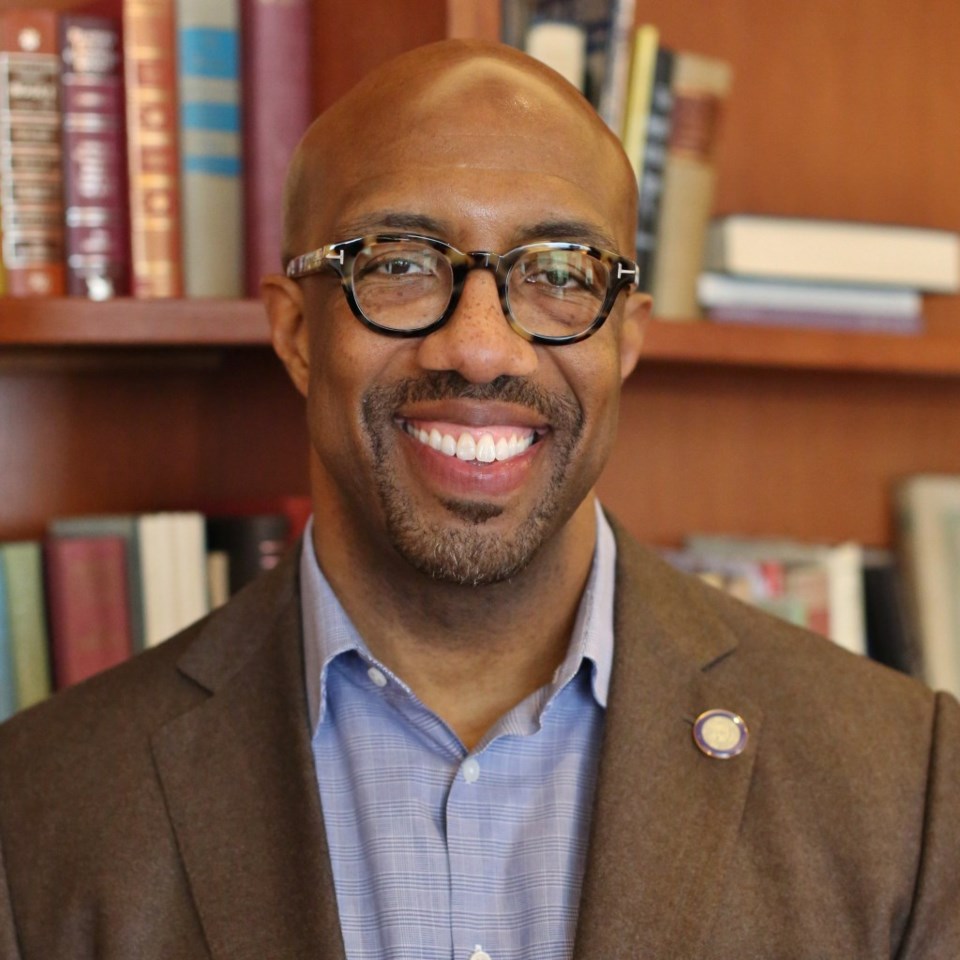
The college’s own employees were at least partly to blame for the latter: A year before Sorrell took over, a member of the college’s community development corporation was caught stealing $20,000 in school funds, the Dallas Morning News reported in February 2008 But Sorrell and the crowd were gathered to discuss another serious blow to the college, one that threatened to derail Sorrell’s presidency.
“The Southern Association of Colleges and Schools called me yesterday,” he told the crowd,” to inform me that they had voted to remove us from their membership.”
In other words, Paul Quinn College had lost its accreditation, the widely recognized standard by which colleges and universities can prove that they are, in fact, following through on their missions to educate young minds. The problem was money, Sorrell explained, meaning that they didn’t have enough.
Students and alumni immediately started buzzing. What does this mean for us? they wondered. How will employers react to the name “Paul Quinn College” on my resume? "That's our question," Shaundrea Guidry, a 25-year-old student told a Dallas Observer reporter present at the June 2009 meeting. "What is the worth of a degree without an accreditation?"
True to form, Sorrell exuded calm. He noted that the college was going to appeal the decision, and argued that the college was still headed in the right direction, as evidenced by the recent 600 percent spike in admission applications.
"People like to write obituaries," Sorrell said. "It is not time to write Paul Quinn's obituary."
He was right. Over a decade later, Paul Quinn College has emerged from its cash-strapped, scandal-ridden mire to become a shining example of a college that does everything right. Sorrell has received the lion’s share of the credit for making that happen, and has become a higher ed celebrity, writing articles for The Atlantic and speaking at the annual South by Southwest conference. He recently appeared on Fortune’s list of The World’s 50 Greatest Leaders (#34, one spot ahead of Reese Witherspoon) and Time magazine’s list of 31 People Who Are Changing The South.
He’s wildly popular on campus too. Students call him “Prez” and eagerly follow his every move on Twitter, where Sorrell frequently promotes equality and racial justice. Those values align with Paul Quinn’s modus operandi as the nation’s first urban work college. The college’s roughly 550 students (80 percent of whom are Black) are required to have a part-time job. In the college’s own words, the urban work college model aims to “eradicate poverty through combining higher education with access to quality jobs, secure housing, and reduced student loan burden.”
Even as higher education faces challenges exacerbated by COVID-19, Sorrell and Paul Quinn are continuing to bring their distinctive education approach to South Dallas and Plano, with an expansion of the work college model.
Officially titled PQC-Plano and launched in 2018, the program gives undergraduate students a chance to work at companies like NTT Data, JPMorgan Chase, and FedEx while earning their bachelor’s degrees. That’s just one way Sorrell is cementing his status as an education innovator while bringing a dose of Paul Quinn College to Collin County.
“Mayor LaRosiliere, the city of Plano, and Paul Quinn College all speak the same language,” Sorrell said at a 2018 event announcing the Plano partnership. “That language is the language of vision, of hope, of possibilities, and of our ‘next’ always being better than our ‘now.’”
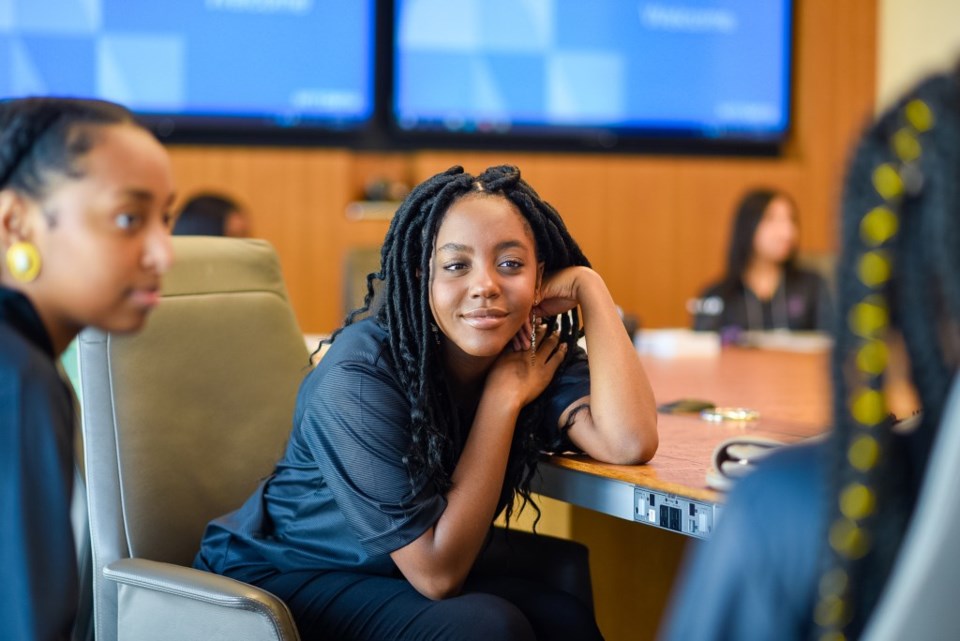
Paul Quinn College - Personal Legend
Sorrell was a basketball star. At Oberlin College, a small liberal arts school in Ohio, he honed his leadership skills on the hardwood. He was the men’s basketball captain for two years, and he still remains the college’s fifth all-time leading scorer. But his greatest hoops memory is a pick-up game far removed from the pastoral trappings of Oberlin, Ohio.
After graduating with a bachelor’s degree in Government, Sorrell earned a J.D. and M.A. in Public Policy from Duke University. One day early in his Duke tenure, he saw a group of students playing basketball with some people he didn’t recognize.
“That guy’s a law professor,” his friend said, pointing out a shirtless gentleman sopping with sweat.
“There’s no way that’s a law professor,” the young Sorrell shot back. But he was, and when the two friends joined in, Sorrell found himself squaring off against a legendary legal mind in a friendly yet competitive game of shirts versus skins.
“In your life, and especially in your educational career, there are people who change you,” he said, reflecting on the game decades later for a Duke Oral History project filmed by students. “These are people who, regardless of the grades I made, affected me in a way that was significant in my life.”
Those professors affected Sorrell not only with lectures, but by making him feel welcomed on a college campus where he was the new guy. In his personal journey, these were the guides. Sorrell tells each of his students to find and embrace their own guides as they pursue their “Personal Legend,” a term he borrows from Paulo Coelho’s famous book The Alchemist.
In the novel, a young Adalusian shepherd dreams of finding a treasure hidden among the Egyptian pyramids. As he sets out to find this fortune, he encounters several helpful guides, including one who tells him, “Your [Personal Legend] is what you have always wanted to accomplish. Everyone, when they are young, knows what their Personal Legend is.”
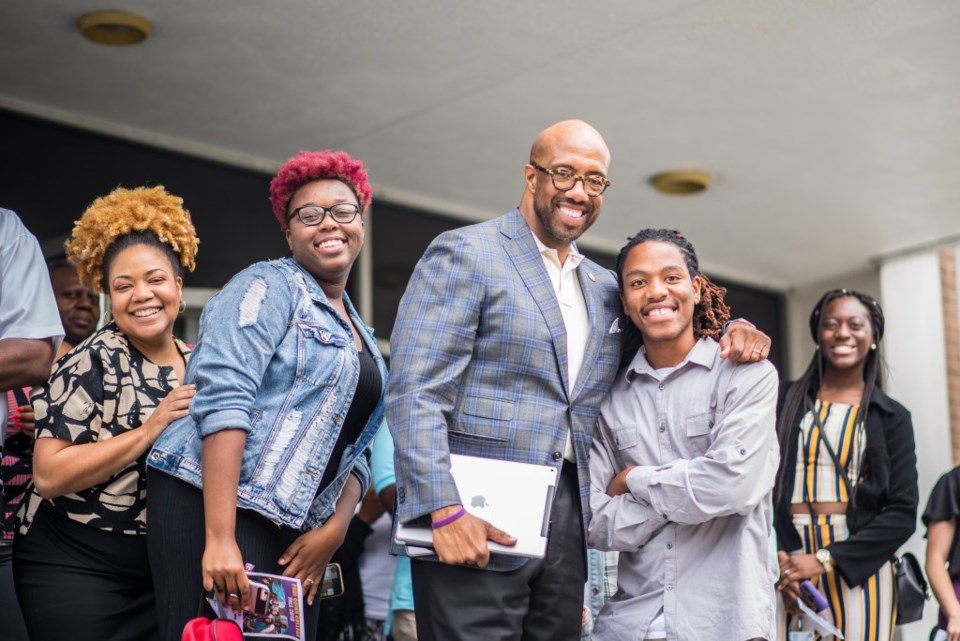
Sorrell requires all incoming Paul Quinn College students to read The Alchemist, though the president’s perspective on personal legends has become less rigid in recent years.
“My personal legend is evolving,” he says. “But, candidly, I can say that I hope to spend the rest of my life advocating for causes and people that I believe in.”
That means advocating for students like Evelyna Rosario, who reaped the rewards of Paul Quinn’s expansion into Plano.
Rosario was the first in her family to work in a corporate office when she landed an internship at AT&T. But as she entered her final year at Paul Quinn College, she had no idea where she would work next. Then she heard about PQC-Plano, and the college’s partnership with JPMorgan Chase.
Sorrell and the college brass know that there are a finite number of job opportunities for students in and around their South Dallas location, and Prez wants his students to have the opportunities they deserve.
“With PQC-Plano, you walk out your front door, and you have options,” he says. “You see what life can look like. People need to see things to realize they can do them.”
There is no physical Paul Quinn College branch in Plano. To save money, the college declined to build any buildings or dormitories in Collin County, and instead houses its Plano-based students at an apartment complex where students pay a reduced rate. Most classes are held virtually, and when in-person lectures are required, professors meet students in the boardrooms at the companies where they work. In the fall of 2019, more than 60 students participated in the program and worked at 10 companies. Sorrell expects both of those numbers to grow.
“The companies see our students as an opportunity to hire diverse, qualified talent,” he says. “Plano is going to become an essential and thriving part of the Paul Quinn college brand. We’re going to expand, with more access to housing without paying exorbitant prices. You won't have the latest in buildings, but you’ll have great places to live and access to great jobs.”
Rosario was one of the more than 20 students who interned at JPMorgan Chase last year, her final year of college. She says the gig was only possible because of the college’s partnership with Plano.
That partnership has already paid dividends for other students, too. Recent graduate Trezuer Butler now has a job at MW Logistics, a company she interned with as part of the Plano program. The program has the admiration of Mayor LaRosiliere, who admits he is envious of students who get to work for some of the major companies in Plano at such a young age.
“That would’ve been a game-changer for me,” he says. “This is going to change their lives.”
Some students say it already has.
“Job programs like this are why I chose the school,” said a recent graduate. “When all you hear about is debt, debt, debt, you want to go to a school that’s going to help you get the best job possible.”
Recent studies show that half of recent college graduates, if given the chance, would have chosen to study something different or attended a different institution. The reasons vary, but the most common rationale is clear: debt. A research study conducted by Harvard Kennedy School found that 42 percent of students aged 18 to 29 say that they or someone in their household has student loan debt, a stat that has ballooned in tandem with the average cost of college.
In fall 2019, a year at a nonprofit, four-year private college cost nearly $50,000, while the average American family makes about $62,000, according to Educationdata.org. When you factor in that 7 in 10 incoming college students say finances will dictate where they enroll in college, it’s easy to see why Paul Quinn’s profile continues to rise.
While most schools are raising tuition costs, Sorrell has been adamant about lowering the cost of his school. Tuition for the 2019-2020 academic year was $14,431.80, down 40 percent from when the school became a work college in 2017. Textbooks can typically cost families an additional few thousand dollars a year, but classes at Paul Quinn are taught using publicly accessible textbooks. And when you add in a scholarship and the jobs students are required to have, the financial picture Sorrell presents is nearly impossible to beat.
“I’m not going to have any debt,” remarks sophomore Kenneth Boston III. “They offered me a full-ride scholarship, so the decision was an easy one.”
Boston’s father and mother attended Paul Quinn College. His parents took turns taking breaks from school to work and support the other, so Kenneth and his brother Keon were literally raised on the college campus. In fact, Boston’s father worked in the business office when Paul Quinn College lost its accreditation.
Like a lot of staff members, students, and alums, he was worried. But Prez had a plan, and it began with cancelling football. More than a decade later, that decision is emblematic of the leadership Sorrell is bringing to Plano.
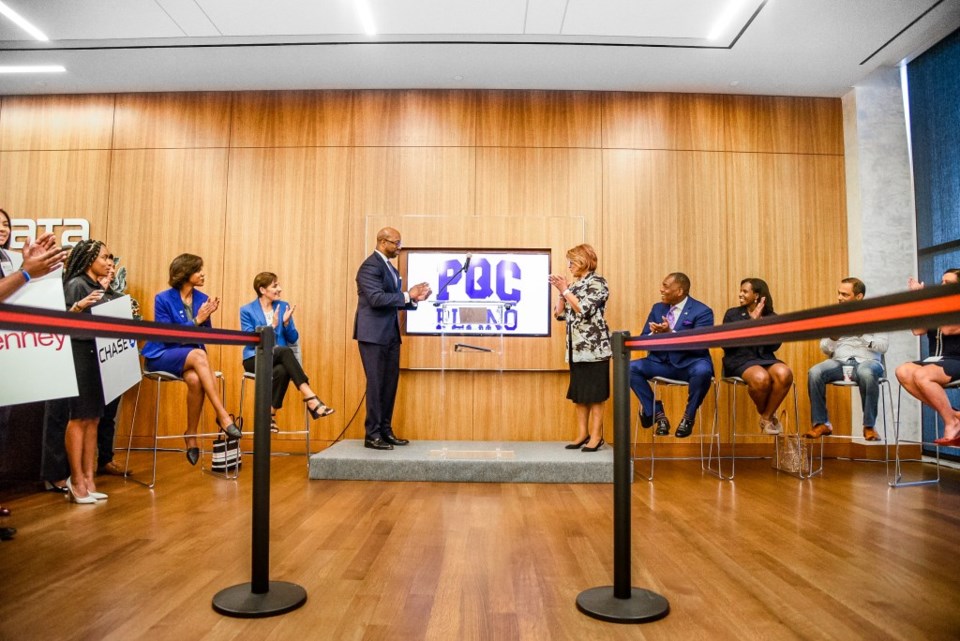
Paul Quinn College - State of Affairs
After earning his JD at Duke, Sorrell worked for a few law firms and was a special assistant in the Clinton White House. Eventually, his law career brought him to Dallas, where he first heard of Paul Quinn College. He befriended some Paul Quinn graduates, but was struck by how little they seemed to care for their alma mater.
“People hated their school,” he told The New York Times in 2011. “They just dogged it.”
Sorrell wanted to help the ailing school. He admired the college’s roots, and thought it could be turned around with the right leadership. So, he sought the presidency gig in the early 2000s, but couldn’t get an interview. Instead, he got a seat on the board, and watched the college continue to slide. Then, in 2007, the president left after just one year, and Sorrell got the top gig.
One of his first major decisions was to kill football, which got Prez his fair share of laughs and glares. After all, this was Texas, where ending a football program might be the eighth deadly sin. But Sorrell knew his plan was essential to securing Paul Quinn’s financial future.
He just didn’t plan on staying long enough to see the full impact of that decision. “The average college presidency is about five years,” he says. “And I thought I’d have the average college presidency.”
He quickly realized that if he wanted to bring long term, positive change to Paul Quinn, then he “didn’t have the luxury” of being a typical president, because Paul Quinn wasn’t facing typical issues. One obstacle was environmental. Paul Quinn’s South Dallas location confers a set of challenges faced by no other college in North Texas.
“Take a look at what surrounds SMU,” Sorrell says. “Take a look at what surrounds UNT Dallas. In what world is that fair? It’s not. It’s not fair.”
SMU is situated in the heart of University Park, just five miles north of downtown, the thriving center of Dallas’ arts, food, and culture, all of which is readily available for its students. However, Paul Quinn students live in a food dessert and are closer to the outskirts of Dallas than its center. With that knowledge entrenched in his brain, how could Sorrell not take action, and compel his students to do the same? How could he host Sunday night fundraisers when people within earshot of his college campus don’t have proper access to food?
So he built a farm where the football field once was, and enlisted students to start growing food, 10 percent of which ends up in kitchens and pantries across Highland Hills. The We over Me farm is just one job opportunity open to students at Paul Quinn. Sorrell also turned Paul Quinn into a work college shortly after becoming president. That decision raised some eyebrows, too, but it has transformed the college and turned Sorrell into a nationally recognized trailblazer.
“When [Sorrell] first came to the board and said, ‘The new strategic plan is we’re going to turn this into a work college and cut the tuition by X percent,’ we all looked at each other like, ‘Is he serious?’” Board of Trustees member Don Cleavenger told The Dallas Morning News. “He did it. He’s gone back to what every college should offer—an affordable college degree with a job at the end without creating crushing debt.”
Sorrell told The New York Times that he wept when the college’s enrollment dipped to 150. That was around the time when the college lost its accreditation. Now the school has a new accreditor, and enrollment is approaching 600 students, a growth that can be attributed to initiatives like PQC-Plano.
By forging partnerships with companies like JP Morgan Chase, he’s done more than grow the Paul Quinn brand: He’s given more students a path forward that includes more opportunity and less—if any—debt.
“Where I’m located now is a five-minute drive from JPMorgan Chase,” Rosario told the Dallas Business Journal. “If I would be in South Dallas, it’s a 45-minute drive or an hour or more with traffic. [This program] has opened a lot of doors for me and given me opportunities that I’m not sure I would have gotten anywhere else.”
Since the COVID-19 pandemic and the murder of George Floyd, Sorrell has continued to show that he is not a typical college president. While others can host black tie galas and court donations from alumnae, Sorrell can be found railing against white supremacy and the crushing inequity his students of color face every day. He has also responded to the COVID-19 crisis with his signature conviction, making bold decisions for the college regardless of politics.
“When you are leading in a pandemic surrounded by failed leadership, you no longer have the luxury of just doing your job,” he says over the phone in July, clearly frustrated by the state and federal government’s response to the virus. “You have to stand in the gap, even if that leaves you exhausted. Even if it leaves you resentful.”
Sorrell turned the Paul Quinn campus into a free testing site, and as of this writing, hundreds of cars were pulling into campus every summer day. Unsurprisingly, Sorrell also made the decision to go fully remote for fall 2020. The college even lowered tuition another $2,325, and they will provide laptops and Wi-Fi hotspots to every student who needs one. In Plano, students are still going to complete their internships as planned. If their employers are back working in an office, the students will too. If not, they’ll work remotely.
Meanwhile, schools like the University of North Texas are refusing students’ pleas to lower tuition, and charging ahead with plans to offer in-person classes. Most colleges throughout Texas are planning to offer at least some classes on campus, as are more than 1,000 other colleges and universities throughout the country.
“Look at the current state of affairs,” he says, referencing the spike in coronavirus cases Texas experienced during the summer. “We have somehow normalized these numbers, but our kids can’t go back to school like this.”
Like everyone else, he has no idea what the future will look like. He’s taking it day by day, and the only constant is his outrage at the state of affairs in the nation and the challenges his students still face.
“I never thought I’d be president for 13 years, but along the way, I found myself getting angrier and angrier about what we were being asked to accept,” he says. “It offended my sense of justice and my faith. That sense of justice seems to have found a place here. Whatever gifts I may have are able to be used in service of people I love.”
Sorrell often thinks about people like William Rainey Harper and Booker T. Washington, two widely-renowned education innovators. But one of his biggest influences remains St. Ignatius, the forefather of the Jesuit priests and the man who preached service.
“It’s not easy to serve,” Sorrell says. “It’s not easy to care deeply about right and wrong. It takes time. Things like PQC-Plano take time. But we do them because students have to see what’s possible. They have to see they are worthy of everything and more.”
Originally published in the September/October 2020 issue of Local Profile.

